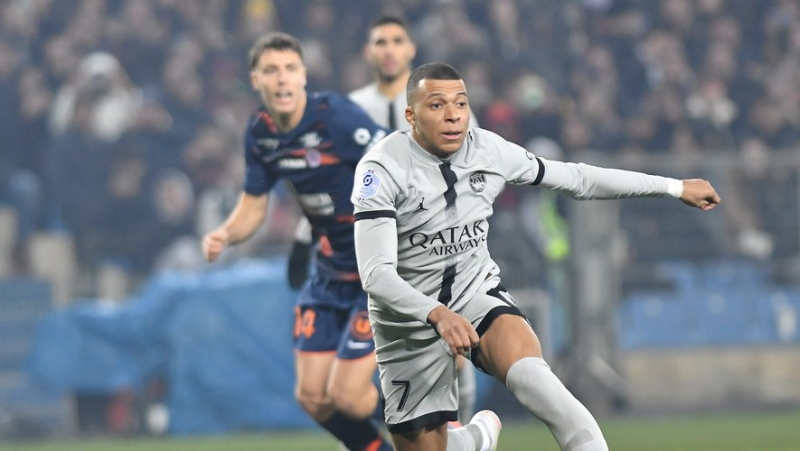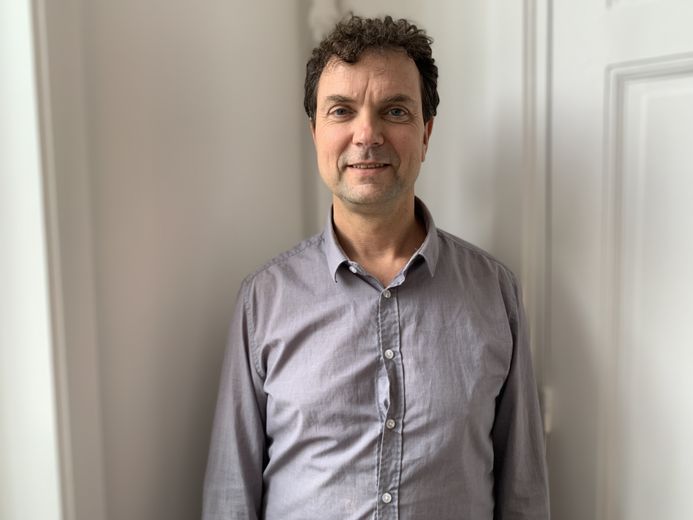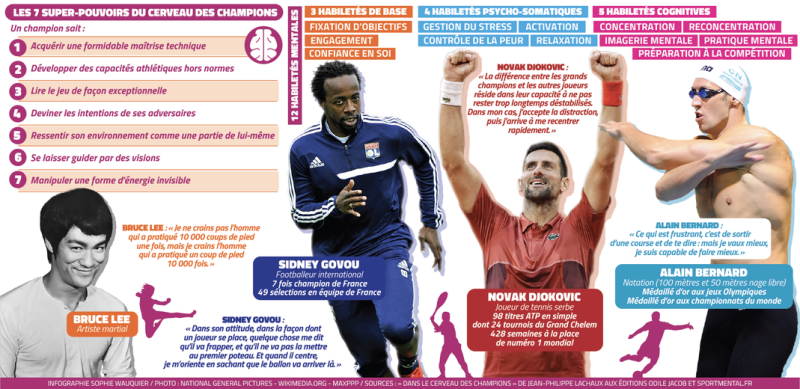“The champion has superpowers”: a scientist’s fascinating investigation into what goes on in the head of the top athlete

Kylian Mbappé, lors d’un match MHSC/Paris. Midi Libre – JEAN MICHEL MART
What makes Kylian Mbappé, Antoine Dupont, Félix and Alexis Lebrun, Léon Marchand and even Kevin Mayer exceptional beings?? As the Euro is launched and a few weeks before the opening of the Olympic Games, Jean-Philippe Lachaux, research director in cognitive neuroscience at the Lyon Neuroscience Research Center, explores the hidden side of high-level athletes with " In the brains of champions, his latest work.
A specialist in the question of concentration, Jean-Philippe Lachaux draws on the testimonies of high-level athletes, and on the state of research in cognitive neuroscience in "In the Brain des champions", published in June 2024 by Odile Jacob (19.90 euros).

Jean-Philippe Lachaux, a specialist in concentration issues, conducted 35 interviews with top athletes. DR – EMILIE CORBINEAU
We often limit a champion to his physique, his technique, his power, we talk about the mind, of course, but we are far from imagining what is happening in his brain… it was your intention to shed some light on this ?
Yes, there is that, knowing that the mind is often only associated with the management of emotions. There are many other things. In fact, technique is in the brain. Hyper-efficient motor neurons interact with each other. In a high-level athlete, taking in information is also very effective, and allows you to concentrate on the important elements and clearly decide what is needed.
And I insisted a lot on concentration, which consists of having a very stable attention, in the right place, at each moment. It’s all cerebral. The technical and physical part is only the visible part of what makes a high-level athlete, it is what happens inside that is the most important.
You say that a top athlete is necessarily someone who is intelligent, contrary to popular belief.
Yes, we always refer to a very particular intelligence, the ability to handle concepts or abstractions. Intelligence is broader than that, already, there is attentional intelligence, the fact of noticing things that others do not notice, the intelligence of social relationships… hellip; and sports intelligence, which is a form of intelligence. Why establish a hierarchy ?
The intelligence of the athlete occupies the brain just as much as the intelligence of the mathematician! Even at this level, there is no reason to put the mathematician above the footballer.
Including athletes who are stigmatized, I am thinking of someone like Franck Ribéry ?
Yes, word choice and the ability to construct sentences are a form of intelligence, but go put a mathematician in the middle of a football match where you have to take information when it goes at 100 an hour… he'll look like an idiot!
As soon as we are taken out of our preferred field, we are completely idiots.
“It's amazing how good they are at the grammar of their sport”
You talk about the superpowers of champions, some seem almost obvious but you go very far, we are touching on very complex things, the ability to feel energies, to pick up micro-signs…
The difference between me and a top tennis player, in reading the game, is identical to what differentiates a CE2 student from a academician. That's really it. It's amazing how good they are at the grammar of their sport. And again, that's a form of intelligence.
There are some truly astonishing things about superpowers. When they tell you that they see what they need to do appearing before their eyes, it’s like a GPS in fact. While they are at the heart of the action. They have a sense of reality that is not the same as common sense.
It’is linked to training, since you remind us that it takes a lot of work to reach the very high level, or there is of innate, even genetics?
Regarding bodily aspects, we know that there are undeniable genetic data. On the other hand, with other "superpowers”, it’s more complicated. Following the coach's instructions when you are a child, for example, you don't know if it's just application or if it's a gift at the start. Roger Federer's first coaches said that it was enough to show him a gesture so that he could immediately repeat it exactly, he learned extremely quickly. But maybe he just knew how to place his attention on the right elements.

Exceptional capabilities for high-level athletes. Midi Libre – SOPHIE WAUQUIER
"The prefrontal cortex is the great organizer"
What do you call PIM when you talk about concentration?
It starts from a common sense observation. There is always a perception, an intention, and a way of acting that will dominate, the brain is always in this state, it is a PIM. First, attention is selective, we cannot perceive everything, there are things that take over, with particular relief. In the same way, you have an intention, you don't have all the intentions in the world at the same time. And then you are in the action, and not just any way.
Being concentrated is when one's perception, intention and way of acting are in line with what one needs to do.
When we talk about concentration, we imagine someone reading a book and staying focused on a text for a very long time. In fact, athletes must be concentrated but on things that are constantly moving. They move from one PIM to another constantly. That’s also why I wrote the book. It is often said that concentration is not suited to our modern lives. But we all have our superpowers.
What are the most important areas of the brain for an athlete?
The prefrontal cortex is a bit like the great organizer, it is more developed in humans than in animals, in adults than in children. In terms of vision there are areas of the motor cortex which will be activated differently depending on the sport. The brain will shape itself to fit perfectly with the environment.
These findings are based on brain imaging ?
It’s a mix between what we know about the brain, and what I learned from athletes, by conducting interviews. The problem is that sport is not very suitable for imagery. Sometimes the best way to understand what's going on is to ask them.
"Stress has a deleterious effect, it leads to bad intentions"
You also say that stress, pressure, don't work. Top athletes are more relaxed than we imagine…
It depends on the moment, though. Stress will have a very deleterious effect, it will lead them towards bad intentions, winning or not losing, for example, and they will slip into overcontrol. A bit as if when we speak, we pay attention to each word, it doesn't work, it slows down, we get confused.
The very best have the ability, when they feel that they are stressed, to bring their attention back to breathing, for example, and to return to much clearer intentions, which is what ;there is something to do right away.
They meditate all the time, in fact.
Yes, but when you meditate, if your mind wanders, breathing brings you back to the moment. When you're hurtling down a ski slope at 200 miles an hour, it can't be that, in a context where everything moves very quickly. It is a form of meditation, where attention is placed on an intentional trajectory. But that’s the principle of meditation.
Any stray thought is a big disturbance: the frustration that lingers after a missed point, someone agitated in the public…
Yes, but when you're a champion, you're going to accept the fact that you're going to be distracted, but you have the immediate ability to sort out what's important and what's irrelevant.
"You can learn anything, as long as you spend time. And you have to accept failure"
How to apply these lessons to our daily lives ?
The first big message I want to convey is that you can learn anything. You won't necessarily become a great champion, but you can learn as long as you spend time and have clear intentions each time. And you have to accept failure: the brain learns from mistakes. There's no need to stress and tense up. I want to pass this message on to younger people.
And I want to send another message about the relationship with concentration: we have this image of tension, of effort. Not at all, in the effort, we can have enormous satisfaction which even goes beyond the medal. Whatever you do, you can, day after day, try to achieve that level of concentration which will be a source of enormous satisfaction. You will tell me that it’s easy to say when you are a researcher, that it’s a profession of passion… but athletes have an extremely difficult job, they do the same thing every day, we get injured, there is a lot of fatigue, we win but often we lose… If they can do it, everyone can do it. It’s a question of relationships at work.
Great athletes are assembly line workers, actually…
Yes, and it's not a question of money. We focus on footballers, tennis players… but there are all these low-profile sports, which we only hear about at the Olympic Games, for which the reward is not even financial. It’s a reward for progress and permanent concentration. You can access it whatever you do, including if you are a cashier in a hypermarket.
But when there is an important victory, there is an emotional release that you don't get anywhere else, it's fire fireworks in the brain…
It’s clear. There are some who are addicted to it, and who have difficulty when they stop their career, who sink into alcoholism…hellip; That’s why we can’t do sport for that adrenaline rush, it has to be secondary. You have to find joy elsewhere.
"There are plenty of ways to watch sports"
You say that the human being is above the machine, that remains true in the age of artificial intelligence?
Yes, because otherwise, we're going into trouble. The machine will always do better. At some point, we have to return to things we learn in Asian philosophy, for example. If you take the tea ceremony, it’s not the tea, the goal. This is the state of mind you are in when you make tea. And a child’s drawing is not a work of art. What is important is the intention he put into drawing. It’s the state of mind that gives all its value to a product. And the machine will never have that.
Which champion impressed you the most?
The most astonishing, whom I did not interview but whom I quote, is the climber Alex Honnold, two seconds of inattention is death, and he does that for four hours. ! When Guy Forget tells me that he sees a colored circle appear on the other side of the net which tells him where to put the ball…hellip; everyone! When Nathan Paulin tells me that he has moments of great ease on his slackline, while he is passing over a wire more than 2 kilometers high…hellip;< /p>
This book is another way of looking at the Euro and the Olympics?
Yes, I wrote a passage about it. You can be in front of your little crappy TV and have the impression of being inside. There are lots of ways to watch sport, and I invite people to be attentive, not to wait for the commentator to scream to capture our emotion. It’s a shame.
I subscribe to read more




